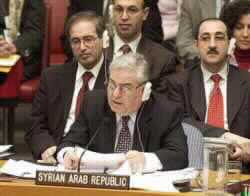After falling short in the Security Council, Arab envoys decided on Monday to seek an emergency session of the 191-nation U.N. General Assembly to revive their campaign for an immediate end to the war in Iraq. "The point of the request is to save the lives of Iraqi civilians," one Arab diplomat said. "We will ask for a cease-fire and a return to peaceful disarmament in Iraq," said the envoy, who spoke on condition of anonymity.
Unlike the 15-nation Security Council, whose resolutions can be binding under international law, the General Assembly can make only political statements expressing the sense of the international community.
But an assembly resolution critical of the U.S.-led war would nonetheless be highly embarrassing to both Washington and London.
"We don't think a General Assembly meeting is necessary," a U.S. official said. "This type of session is only going to divide U.N. members. What we need right now is to deal with the situation of the Iraqi people on the ground."
Malaysian Ambassador Rastam Mohd Isa, who heads the group of nonaligned countries at the United Nations, plans to request the special session, in a letter to Portuguese U.N. Ambassador Goncalo de Santa Clara Gomes, Arab envoys said.
Santa Clara Gomes is the assembly's acting president in the absence of Jan Kavan of the Czech Republic, who is out of town until April 9, U.N. officials said.
'HALT THE AGGRESSION'
Arab diplomats said they were seeking the assembly meeting on orders from Arab foreign ministers, who adopted a declaration in Cairo last week "affirming (their) solidarity with Baghdad" and condemning "the American-British aggression against Iraq."
The declaration instructed Arab nations at the United Nations to initially try to "halt the aggression" through an emergency session of the Security Council.
Failing that, it told the bloc to take the matter to the General Assembly.
The council held a two-day debate on Iraq last week. But Arab envoys, sensing they lacked the votes, scrapped plans to press for a vote on a resolution demanding an immediate withdrawal of foreign forces from Iraq.
Both the United States and Britain have veto power in the Security Council. Calling for a vote, only to see a resolution defeated, would have risked legitimizing the U.S.-British invasion after the fact, the envoys said.
It was not immediately clear how much support Iraq could count on in the General Assembly, where Washington and London do not have a veto.
But the United States has been aggressively lobbying governments around the world for the past two weeks to help head off an emergency assembly session on Iraq.
PHOTO CAPTION
Syria's U.N. Ambassador Mikhail Wehbe speaks following a Security Council vote that unanimously approved a resolution to restart a U.N. humanitarian food program for Iraq Friday, March 28, 2003, at United Nations headquarters. (AP Photo/Eskinder Debebe, United Nations, HO) - Mar 28 3:38 PM ET
- Author:
& News Agencies - Section:
WORLD HEADLINES


 Home
Home Discover Islam
Discover Islam Quran Recitations
Quran Recitations Lectures
Lectures
 Fatwa
Fatwa Articles
Articles Fiqh
Fiqh E-Books
E-Books Boys & Girls
Boys & Girls  Articles
Articles










